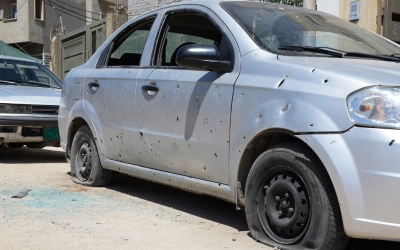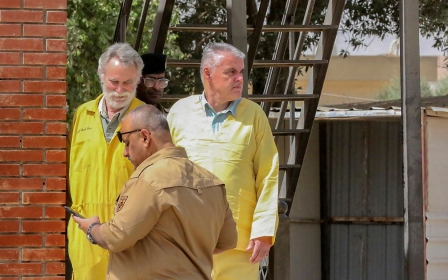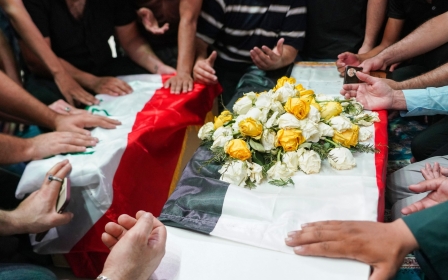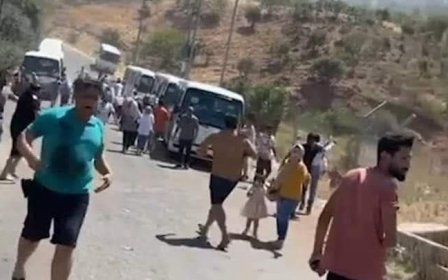Iraq: Rage follows sorrow in shell-shocked Zakho following attack
Along the corridors of the Zakho General Hospital, doctors and nurses are still busy offering medical care for those who were wounded by suspected Turkish artillery shelling at the Barakh tourist resort in northern Iraq last week.
Those with more severe injuries have been sent on to the hospital in Duhok, or even further to Baghdad and other southern provinces, and just two families remain in the Zakho hospital, at the recommendation of their doctors.
Worood Abbas, a 40-year-old from Karbala governorate, came to Zakho with her family in an attempt to escape the scorching heat of southern Iraq.
'I lost my husband, he was everything for me... we came for pleasure but it turned into a funeral'
- Worood Abbas
On 20 July a barrage of artillery shells struck the resort, wounding 23 people and killing nine.
Among those killed was Abbas's husband, Sabah.
New MEE newsletter: Jerusalem Dispatch
Sign up to get the latest insights and analysis on Israel-Palestine, alongside Turkey Unpacked and other MEE newsletters
"Can words send back my killed husband? Can speech heal my son's injury? Of course not," she told Middle East Eye, speaking from her hospital bed.
"If I speak to you till the morning, nothing will change unless we have another government that takes care of their people instead of their own interests."
Abbas's 10-year-old son and 13-year-old daughter were both wounded and sent to Karbala for treatment. Her husband died at the resort.
"The shells still ring out in my ear, I cannot forget the time of falling shells on the resort. I remember how mothers ran to search for their killed and injured loved ones, others were hurrying with bloodstained clothes and shouting for help," she said, wiping away tears.
"I lost my husband, he was everything for me... we came for pleasure but it turned into a funeral."
'Where do we go to live in peace?'
The Iraqi government has blamed Turkey for the attack in Zakho, and there have been protests across the country and repeated calls for Turkish forces, which have dozens of bases across northern Iraq, to be expelled.
Turkey has denied responsibility for the shelling and has suggested that Kurdistan Workers' Party (PKK) might be responsible.
The country has launched repeated military operations in northern Iraq in an attempt to crush the PKK, which has fought a guerilla war against Turkey since 1984.
Dozens of civilians have been killed by Turkish artillery and air strikes, mainly in the Duhok region, while hundreds of villages have been depopulated. Turkey has accused the PKK of forcibly depopulating villages itself.
Aseel Fadhel is another Karbala resident receiving treatment in the Zakho hospital for injuries sustained during last week's attack.
Although MEE was unable to interview her as she had just left the surgical operating room and was under general anesthesia, a relative, Abu Mustafa, agreed to speak on her behalf.
"Aseel suffers from a severe injury in the right knee and [also] in the left thigh area. The doctors have operated on her knee, and let's see how things are going later," he said.
Abu Mustafa had been with Fadhel at the resort when he left to go and get food. While he was away, he heard a loud blast that he originally thought was an exploding electricity generator.
"While my family and all the kids were playing, enjoying the cool weather here, suddenly the first shell hits the resort, then the second one hits the lake where families go to get cool," he said.
"I was at the other side, bringing food to my family. I only heard the bomb sounds - then people and running and shouting, asking for help."
Even though he is furious at Turkey for the attack, he is no less angry at his own government, which he sees as weak and unable to defend the country's sovereignty.
He said that he almost wished former ruler Saddam Hussein were still in power, suggesting he would have at least taken action against Turkey.
"Iraqis have experienced wars over the past decades, until the last war against [the Islamic State], but we are living another war, which is the Turkish violations against our people and the land," he said.
"Where do we go to live in peace?"
'Blatant aggression'
Iraq's government has attempted to raise the issue of the Zakho strike with the international community.
On Tuesday, at an emergency special session of the UN Security Council held at Iraq's request, Iraq's Foreign Minister Fuad Hussein condemned what he called "blatant aggression committed by the Turkish army against innocent civilians and their property" and said there had been "22,742 Turkish violations in Iraqi territory" since 2018.
'We are living another war, which is the Turkish violations against our people and the land'
- Abu Mustafa
He told Iraqi state media that he would be seeking the UN's help in expelling both the PKK and Turkish forces from Iraq.
However, with Iraq still stuck in a political deadlock following elections in October that have failed to produce a new government, few expect there will be much action taken to dislodge the second-largest Nato army from the north of the country.
"Our current government and politicians only take care of their positions and work in their favour, not our favour. No more, no less," said Abbas.
She said her husband, a policeman, had spent most of his life "serving the country".
"His eyes were affected while serving. He went to Iran for medical treatment, but the operation failed," she said. "Some doctors advised to treat his eyes in the Kurdistan region, so he told me we'd all go together for both purposes - treatment and pleasure.
"Sadly he died in the attack."
This article is available in French on Middle East Eye French edition.
Middle East Eye delivers independent and unrivalled coverage and analysis of the Middle East, North Africa and beyond. To learn more about republishing this content and the associated fees, please fill out this form. More about MEE can be found here.





